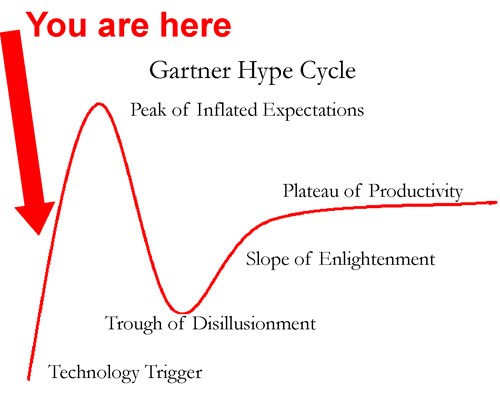World's Auto Execs Don't Buy Their Electric Cars Hype

The majority of car makers the world over think that for the next five years, electric cars will remain too expensive to stand a chance in the mass market. Their saving grace must be government subsidies. Without government money, EVs are priced out of the market.
Nevertheless, most automakers think that research and investment in this category is important, almost 90 percent are planning to invest in hybrid systems, battery electric power or hydrogen fuel-cell technologies over the next five years.
These are, in a nutshell, the sobering results of the KPMG 2011 Global Automotive Executive Survey, which asked over 200 global automakers, suppliers and dealers where they think their business will be going over the coming five to 10 years.
Here are the main insights:
- Fuel-efficiency remains the biggest consideration when purchasing a car.
- The growth (but not the volume) will be in hybrid and electric vehicles over the next five years.
- A two-tier global market evolves: Mature countries struggle to cope with changing mobility behavior. Up-and-coming regions push to deliver a variety of cars to populations eager for greater mobility.
- Population growth and urbanization is driving a significant change across the entire automotive landscape.
- While the world waits for affordable electric vehicles, ‘mobility service solutions’ (short-term rental of a car, or various modes of transport) are what some respondents believe may be game-changing. Only nine percent of respondents believe that mobility solutions will represent a significant part of their strategy. However, some automakers like Daimler, Peugeot, BMW and others are already investing in this area. Says KPMG: “Those who own the mobility grid could well be the same as those who own the market.”
- Development of alternative fuels and powertrain technologies is risky and costly. 68 percent of major players are opting to enter into strategic alliances or joint ventures with suppliers rather than seek capital and go it alone.
- Overcapacity continues to be a chief concern in both mature and emerging markets. Almost two-thirds of respondents believe the US is the most overbuilt, with Japan and Germany following. China and India are expected to reach overcapacity within five years.
Two hundred automotive executives participated in the survey. Over half were business unit heads or higher.

Bertel Schmitt comes back to journalism after taking a 35 year break in advertising and marketing. He ran and owned advertising agencies in Duesseldorf, Germany, and New York City. Volkswagen A.G. was Bertel's most important corporate account. Schmitt's advertising and marketing career touched many corners of the industry with a special focus on automotive products and services. Since 2004, he lives in Japan and China with his wife <a href="http://www.tomokoandbertel.com"> Tomoko </a>. Bertel Schmitt is a founding board member of the <a href="http://www.offshoresuperseries.com"> Offshore Super Series </a>, an American offshore powerboat racing organization. He is co-owner of the racing team Typhoon.
More by Bertel Schmitt
Latest Car Reviews
Read moreLatest Product Reviews
Read moreRecent Comments
- Kjhkjlhkjhkljh kljhjkhjklhkjh A prelude is a bad idea. There is already Acura with all the weird sport trims. This will not make back it's R&D money.
- Analoggrotto I don't see a red car here, how blazing stupid are you people?
- Redapple2 Love the wheels
- Redapple2 Good luck to them. They used to make great cars. 510. 240Z, Sentra SE-R. Maxima. Frontier.
- Joe65688619 Under Ghosn they went through the same short-term bottom-line thinking that GM did in the 80s/90s, and they have not recovered say, to their heyday in the 50s and 60s in terms of market share and innovation. Poor design decisions (a CVT in their front-wheel drive "4-Door Sports Car", model overlap in a poorly performing segment (they never needed the Altima AND the Maxima...what they needed was one vehicle with different drivetrain, including hybrid, to compete with the Accord/Camry, and decontenting their vehicles: My 2012 QX56 (I know, not a Nissan, but the same holds for the Armada) had power rear windows in the cargo area that could vent, a glass hatch on the back door that could be opened separate from the whole liftgate (in such a tall vehicle, kinda essential if you have it in a garage and want to load the trunk without having to open the garage door to make room for the lift gate), a nice driver's side folding armrest, and a few other quality-of-life details absent from my 2018 QX80. In a competitive market this attention to detai is can be the differentiator that sell cars. Now they are caught in the middle of the market, competing more with Hyundai and Kia and selling discounted vehicles near the same price points, but losing money on them. They invested also invested a lot in niche platforms. The Leaf was one of the first full EVs, but never really evolved. They misjudged the market - luxury EVs are selling, small budget models not so much. Variable compression engines offering little in terms of real-world power or tech, let a lot of complexity that is leading to higher failure rates. Aside from the Z and GT-R (low volume models), not much forced induction (whether your a fan or not, look at what Honda did with the CR-V and Acura RDX - same chassis, slap a turbo on it, make it nicer inside, and now you can sell it as a semi-premium brand with higher markup). That said, I do believe they retain the technical and engineering capability to do far better. About time management realized they need to make smarter investments and understand their markets better.


































Comments
Join the conversation
"Fuel-efficiency remains the biggest consideration when purchasing a car" How odd. I wonder why people worry about that more than total cost of ownership per mile? After all, I can think of several relatively cheap cars that cost more in tires than gas.
“Fuel-efficiency remains the biggest consideration when purchasing a car” No it isn't. We might talk about fuel efficiency but if it REALLY was people would never buy SUVs or minivans for commuter duty. Go visit Europe and see what people drive when they are SERIOUS about saving money on fuel. The USA has several high mileage options - the Prius, the Insight, and the Detroit hybrids. Then there are the nearly 50 mpg VW turbo diesels. If gas mileage was tops on people's lists then they would be buying these more than any other vehicles on the market. People would be looking at the smallest engine options vs the "poweh" options like the V-6 and V-8 engines. They would be clambering for manual transmissions to squeeze the extra 1 mpg out of their engines. I think there alot of people who THINk they need 300 mile ranges just like there are alot of people who think they need 200 HP to bring home the groceries. If that is what they like so be it. I'm confident that most of us here can reset our trip odometers today and find that our daily commutes are under 100 miles per day. I could just about drive to work on flashlight batteries (14 miles round trip). Get these cars to market now in numbers and people will buy them if they are sold at reasonable costs ($25K). The problem is that the automakers know that EVs are inevitable with the march of technology and the EV represents a huge game changer to the revenue machine that the automakers have so carefully designed and tweaked to max profits over the years. Why would any company willingly shoot their cash cow? I can't blame them. The fact is that we are going to NEED some of these EVs in the traffic mix to minimize tailpipe emissions in crowded cities. These car companies are going to stall the technology as long as possible. They are going to get all the green marketing and green kudos they can from the technology without releasing any electric cars. Now that Nissan is releasing the Leaf, if the product is successful, then all the other manufacturers will be compelled to release similar products to a few years' time or look like they are out of date. I figure there will be some sort of critical mass at some future point (a decade after EVs reach the mainstream?) where there are more EVs are sold than gasoline or diesel vehicles and we'll watch the automobile suppliers that build engine parts disappear. We'll also begin to see the service departments of dealers begin to change in significant ways. Gone will be oil changes and filter changes. Brakes will outlast the car. My CR-V still has it's original rear brake shoes at 211K miles. A vehicle with regen brakes will likely never need brake parts or perhaps it'll need a single set of front pads at some point. Yeah car companies see the writing on the wall. The question was simply who would pull the trigger first. Toyota did with the RAV4-EV (selling it to consumers) but GM and Chevron managed to sue them back into line over the battery. This time it's Nissan who wants to be first. It might be Ford that offers EV#2 with the Focus. That car certainly looks nice but what will the production version look like? Will probably lose the nice wheels, maybe the interesting nose and tail. Maybe they'll get the green cred and then never build it. See GM and fuelcell technology (among others).